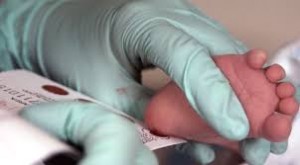Nine years ago, my daughter Juliet was born. She had ruby-red lips, dark eyes, and Down syndrome. While I haven’t considered changing the first two characteristics, I have paid attention to possible treatments for the last one.
Earlier this year, researchers announced that that they had successfully “turned off” Down syndrome. Down syndrome is caused by an extra 21st Chromosome and they had genetically turned off the third copy in cells in petri dishes. Mere months later, researchers at Johns Hopkins announced that they had reversed the effects of Down syndrome.
From the news report:
The researchers injected into the brains of newborn mice a molecule of sonic hedgehog pathway agonist to boost the growth of a gene called SHH, a gene critical to brain development. Untreated, brains with Down syndrome typically have a cerebellum 60% of normal size; the one injection normalized the cerebellum’s growth through adulthood. The researchers also found that the treated mice benefited in learning and memory, being able to navigate water mazes as well as typical mice. However, the researchers caution that translating this treatment into humans with Down syndrome could trigger cancer.
This news was reported widely and seen as a very good thing: yet another potential treatment for overcoming the intellectual disability associated with Down syndrome. But, the news made me think of a lesson I learned when we tried an earlier treatment for our daughter.
The Principle of Universality
When our daughter was a newborn, I latched onto the logic that since chromosomes contain genes which affect how the body develops and operates. My daughter happened to have an extra chromosome, so couldn’t that extra expression of genetic material be counterbalanced or neutralized? We went for our one-year-old appointment and our local geneticist almost off-handedly asked, “I’m sure you’ve heard about TNI?” We hadn’t.
TNI stands for Targeted Nutritional Intervention. It is a protocol of mega-dosages of vitamins and natural products. TNI marketing promises that it helps overcome the effects of Down syndrome by using the logic of balancing out the over-expression of the 21st Chromosome. The dosages are heavy with anti-oxidants to reduce oxidative stress found in the cells of those with Down syndrome, as well as immune system building vitamins.
TNI is controversial. Neither national Down syndrome organization supports it due to a lack of medical studies. Further, part of the TNI protocol includes treating your child with pharmaceuticals, as there are reports that anti-depressant and anti-seizure drugs possibly improve cognition in individuals with Down syndrome.
We ultimately chose just the vitamin supplements of TNI after our nutritionist checked out the dosages and concluded that, at worst, it would do no harm beyond just costing us money. When I shared our decision with a good friend of mine who also has a daughter with Down syndrome, he asked me a very salient question:
What mega-vitamins are you taking to overcome your deficiencies?
His point being, I was somewhat using my daughter as a medical guinea pig on the theory that mega-vitamin dosages would make her smarter. Why wasn’t I, then, taking drugs to improve my cognition?
College students are using ADHD medicine to reportedly improve their concentration. Authors and rock bands have said mind-altering drugs helped them create their art. And, athletes are taking all sorts of performance enhancing products. I’m not taking any of that. I’m even choosing to be bald despite all sorts of products that promise to recapture my youth and virility by growing/transplanting/plugging a new head of hair. Yet, I was willing to subject my daughter to enhancement treatment.
Ultimately, we stopped TNI after about a year because my daughter couldn’t stand the vitamin-y taste. But I’m reminded of my friend’s question whenever I hear about treatments for Down syndrome like the recent sonic hedgehog injection and how Down syndrome was “turned off.” We should consider the principle of the golden rule–in ethics called the “universality principle”–when considering these potential treatments for Down syndrome.
When it comes to these treatments: if it’s so good, would you do it to yourself?
Mark W. Leach blogs at www.downsyndromeprenataltesting.com.
This is adapted from a series of posts on the new possible treatments for Down syndrome.
He has left out the picture of the two-faced cat, but you can view that at this link.











